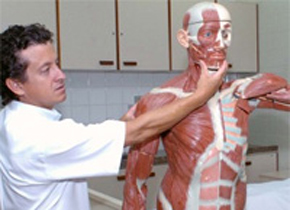

Some 40 post-graduate students from Brazil and 40 from other countries will be selected to participate in the event in December
Some 40 post-graduate students from Brazil and 40 from other countries will be selected to participate in the event in December.
Some 40 post-graduate students from Brazil and 40 from other countries will be selected to participate in the event in December.

Some 40 post-graduate students from Brazil and 40 from other countries will be selected to participate in the event in December
By Elton Alisson
Agência FAPESP – The São Paulo School of Advanced Sciences on Electrochemistry, Energy Conversion, and Storage (SPASECS) – Escola São Paulo de Ciência Avançada em Eletroquímica, Conversão e Armazenamento de Energia – is accepting applications until July 28 for full scholarships to attend the event, which will be held from December 7 to 14, 2013, at the Universidade de São Paulo’s Chemistry Institute in São Paulo.
A total of 80 post-graduate students, including 40 Brazilians and 40 foreigners, will be selected to have their travel, room and board costs covered by FAPESP. Current FAPESP scholarship recipients will not be eligible to receive financial support to participate in the School but can register to attend.
The event is being held under the auspices of the São Paulo School of Advanced Sciences – a FAPESP funding modality that supports brief courses in advanced research in different fields of knowledge – and is being organized by USP’s Chemistry Institute and coordinated by Professor Roberto Manuel Torresi.
According to Torresi, the main objective of SPASECS is to provide a theoretical and experimental basis for understanding electrochemistry and thereby to increase the student participants’ knowledge of electrochemistry and the different techniques available in the field.
“The entire chemical reaction that is produced by the transfer of electrons that flow through an external circuit and produce electrical energy that can be utilized to make a device work – such as charging the battery of a cell phone or a notebook – is the focus of electrochemistry,” explained Torresi.
The event will offer theory classes and practical laboratory activities involving the main techniques utilized in the study of electrochemical reactions, to broaden the knowledge of the students selected to attend. Additionally, students will conduct experiments related to applied themes that are considered important in the area, such as rechargeable batteries, combustion cells and electrochemical capacitors.
The theory classes and practical activities will be jointly taught by professors and teaching assistants from USP and the University of Southampton, with which FAPESP maintains a cooperation agreement.
“The Chemistry School that the University of Southampton has sponsored for the past 35 years is one of the most famous electrochemistry schools in the world. The university will send some professors to give classes, conduct experiments and hold meetings at SPASECS,” explained Torresi.
In addition to professors from the University of Southampton and other U.K. universities, researchers from Spain, Brazil and France will also hold conferences during the event, during which the conversion and storage of energy will be covered.
Among the researchers is University of Picardie Jules Verne Professor Jean-Marie Tarascon. “He is considered one of the five most important researchers worldwide in the area of lithium-ion batteries,” explained Torresi.
Other speakers at the school will be Bryan McCloskey, an IBM researcher in the area of lithium-air batteries; Pedro Gómez-Romero, of Spain’s Nanoscience and Nanotechnology Research Center (CIN2); Peter Hall, of Sheffield University in the United Kingdom; Phil Bartlett, of the University of Southampton; and Edson Ticianelli, of USP São Carlos’ Chemistry Institute, the site of one of São Paulo’s most important research groups in the electrochemistry area.
“The biggest numbers of electrochemistry research groups in São Paulo are located in São Carlos at USP and the Universidade Federal de São Carlos (UFSCar). But there are several groups throughout the state that are responsible for a good portion of the electrochemistry developed in Brazil and have made contributions mainly in the area of electroanalytics and conversion and storage of energy,” stressed Torresi.
Consolidated area
According to Torresi, electrochemistry is a consolidated field of research in São Paulo, where there are groups specialized in different aspects, such as fuel cells, rechargeable batteries, electrochemical capacitors, solar cells, corrosion, and sensors and electrochemical biosensors for the detection of various compounds that are toxic or of clinical interest.
The idea behind the school is to further human resources training in an area in which the majority of the equipment utilized in laboratories is automated and data acquisition occurs via computer.
The researchers stressed that, on the one hand, these systems make experimental work easier and increase the speed of data acquisition; on the other hand, they do not facilitate an understanding of the benefits and difficulties of using each electrochemical technique. Furthermore, researchers often have difficulty choosing the best technique with which to address a particular problem.
As a result, SPASECS intends to contribute to disseminating and deepening the knowledge of student participants regarding theoretical techniques and aspects of electrochemistry to maximize the use of computer programs that accompany the equipment.
“We have already received more than 100 applications from candidates in countries on every continent,” affirmed Torresi. The number of participants was limited to 80 to guarantee access to equipment to conduct experiments in small groups.
For more information or to apply, visit: www.usp.br/escoladeeletroquimica.
Republish
The Agency FAPESP licenses news via Creative Commons (CC-BY-NC-ND) so that they can be republished free of charge and in a simple way by other digital or printed vehicles. Agência FAPESP must be credited as the source of the content being republished and the name of the reporter (if any) must be attributed. Using the HMTL button below allows compliance with these rules, detailed in Digital Republishing Policy FAPESP.





